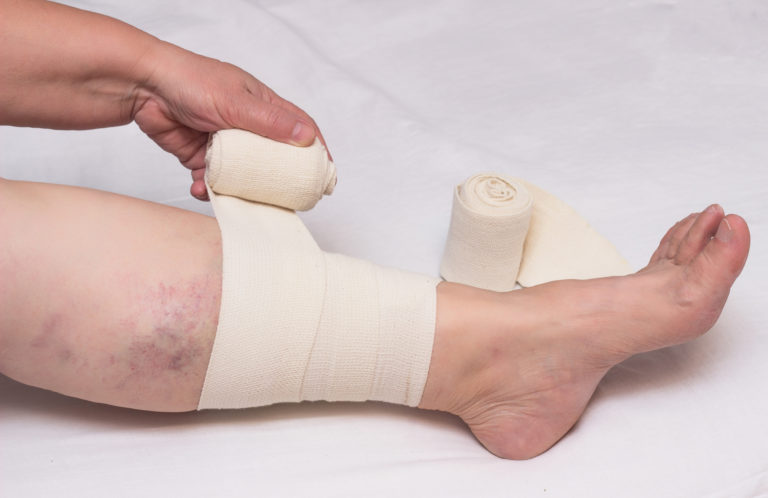Innovations in Vein Health: Exploring the Future of Vascular Care
 Introduction
Introduction
As we conclude our “24 Days of Vein Health” campaign, we turn our focus to the future with “Innovations in Vein Health.” This exciting topic delves into the latest advancements in vascular care, highlighting how new technologies, treatments, and research are revolutionizing the way we approach vein health.
The Latest Advancements in Vein Health
Exploring groundbreaking treatments and technologies in the field of vein health reveals a dynamic and rapidly advancing area of medical science. Recent years have seen significant strides in developing new treatments, minimally invasive procedures, novel pharmaceuticals, and diagnostic tools. Here’s an overview of some of these innovative advancements:
Minimally Invasive Procedures
- Endovenous Laser Ablation (EVLA): EVLA uses laser energy to treat varicose veins. A thin laser fiber is inserted into the vein, delivering just enough laser energy to seal it shut. This procedure is minimally invasive, causes less discomfort, and has a quicker recovery time compared to traditional surgery.
- Radiofrequency Ablation (RFA): Similar to EVLA, RFA uses radiofrequency energy to heat and close off varicose veins. It’s known for its high efficacy rate and minimal downtime.
- VenaSeal™: This is a relatively new procedure where a medical adhesive is used to close varicose veins. It eliminates the need for multiple needle sticks and compression stockings post-procedure, offering a more comfortable treatment experience.
Novel Pharmaceuticals
- New Anticoagulants: The development of new anticoagulant drugs, which reduce the risk of blood clots, plays a crucial role in managing deep vein thrombosis (DVT). These newer medications often have fewer side effects and do not require regular monitoring, unlike traditional anticoagulants.
- Phlebotonics: These are drugs used to improve the tone of veins, increase blood flow, and reduce inflammation. Recent developments in phlebotonics are focused on improving their efficacy and reducing side effects.
Cutting-edge Diagnostic Tools
- Advanced Doppler Ultrasound: This non-invasive imaging technology has become more sophisticated, providing detailed images of the vein structure, blood flow, and blockages. It’s crucial for accurate diagnosis and for planning treatment strategies.
- Venography with Contrast Enhancement: Improvements in venographic procedures, including better contrast materials and imaging techniques, allow for more detailed and clearer vein visualization.
- Wearable Technology for Vein Health Monitoring: Wearables that can monitor circulatory health are in development. These devices aim to track changes in blood flow or vein condition, potentially alerting users to early signs of vein issues.
Future Prospects and Research
- Gene Therapy and Vein Health: Research in gene therapy explores the possibility of treating or even preventing hereditary vein conditions. This field is still in its early stages but holds promise for the future.
- Regenerative Medicine: The potential of stem cells and other regenerative techniques to repair damaged veins is an exciting area of research. This could revolutionize treatment for severe vein damage or chronic conditions.
- Personalized Medicine: With advancements in genetic testing and personalized medicine, treatments for vein conditions can become more tailored to individual genetic profiles, improving efficacy and reducing risks.
These advancements represent a significant leap forward in vein health management. They not only offer more effective and less invasive treatment options but also pave the way for a future where vein health issues can be managed with greater precision and personalization. As research continues, we can expect even more innovative solutions to emerge in the field of vascular care.
The Role of Technology in Vein Health
Wearable Tech for Vein Monitoring
The adaptation of wearable technology to monitor vein health is a burgeoning field that holds significant promise for the early detection and management of venous conditions like Deep Vein Thrombosis (DVT) or varicose veins. This emerging technology is designed to provide continuous, non-invasive monitoring of circulatory health, offering numerous advantages in both preventive care and the management of existing conditions.
How Wearable Technology Works for Vein Health
Wearable technology for vein health typically involves devices like smartwatches, fitness trackers, or specialized wearable sensors. These devices use various sensors to collect data related to blood flow, oxygen levels, and other circulatory metrics. For example:
- Optical Sensors: Many wearables use optical heart-rate sensors that can track changes in blood volume and flow by shining light into the skin and measuring changes in light absorption.
- Bioimpedance Sensors: These sensors measure the resistance of blood flow, which can provide information about blood volume and vascular health.
Potential Applications in Vein Health Monitoring
- Early Detection of DVT: By continuously monitoring changes in blood circulation and oxygenation levels, wearables could potentially help in the early detection of DVT, which is critical for preventing serious complications.
- Monitoring Varicose Veins: Wearables may be able to detect changes in blood flow or volume in the legs, which can be indicative of developing varicose veins. This could be especially useful for individuals at higher risk due to genetics or lifestyle factors.
- Post-Treatment Monitoring: After treatment for venous conditions, wearables can help monitor recovery and the effectiveness of the treatment, alerting users and healthcare providers to any concerning changes.
Advantages of Using Wearable Technology
- Continuous Monitoring: Wearables provide ongoing monitoring, offering a more comprehensive picture of vein health over time compared to traditional, intermittent measurements.
- Convenience and Non-invasiveness: These devices allow for vein health monitoring in a non-invasive manner, making it easier and more comfortable for users to keep track of their vascular health.
- Early Intervention: Continuous monitoring can lead to earlier detection of potential issues, allowing for prompt medical intervention and potentially preventing more severe complications.
Challenges and Considerations
- Accuracy and Reliability: Ensuring the accuracy and reliability of data collected by wearables is crucial. Ongoing research and development are focused on enhancing the precision of these devices.
- Interpretation of Data: The interpretation of data collected by wearables requires medical knowledge. There is a need for integrated systems where healthcare providers can access and analyze this data effectively.
- Privacy and Data Security: As with any technology that collects health data, ensuring user privacy and data security is paramount.
The Future of Wearable Technology in Vein Health
The future of wearable technology in vein health looks promising, with ongoing research and advancements in sensor technology. As these devices become more sophisticated, they could play a significant role in preventive healthcare, early detection, and personalized management of vein-related conditions. The integration of artificial intelligence and machine learning could further enhance their capabilities, making them a vital tool in vascular health monitoring and management.
AI and Machine Learning
The integration of Artificial Intelligence (AI) and Machine Learning (ML) into the healthcare sector, particularly in diagnosing and treating vein-related conditions, represents a significant leap forward in medical technology. These advanced computational tools are transforming how vascular diseases are identified, managed, and treated, offering enhanced accuracy, efficiency, and personalized care.
AI and ML in Diagnosing Vein-Related Conditions
- Image Analysis: AI algorithms are being employed to analyze medical imaging such as ultrasounds, MRI, and CT scans. These algorithms can detect abnormalities in vein structure or blood flow, identifying issues like deep vein thrombosis (DVT) or varicose veins with high precision.
- Predictive Analytics: AI can analyze large datasets to identify patterns and risk factors associated with vein conditions. This helps in predicting which patients are at higher risk for developing certain vascular diseases, allowing for early intervention.
- Symptom Analysis: AI-powered tools can analyze patient-reported symptoms and medical histories to assist in the diagnosis of vein-related conditions, sometimes identifying subtle signs that might be overlooked in traditional assessments.
AI and ML in Treating Vein-Related Conditions
- Personalized Treatment Plans: AI systems can analyze patient data, including genetic information, to recommend personalized treatment plans. This tailored approach can significantly improve treatment efficacy and reduce side effects.
- Treatment Optimization: Machine learning algorithms can learn from treatment outcomes to continually improve and refine treatment strategies for vein-related conditions.
- Robot-Assisted Surgery: In some cases, AI-driven robotic systems are being used to assist surgeons in performing vein-related procedures. These systems enhance precision and control, potentially leading to better outcomes and faster recovery times.
Challenges and Future Prospects
- Accuracy and Validation: While AI and ML show great potential, ensuring the accuracy and validation of these technologies is crucial. Ongoing research is focused on refining algorithms to reduce errors and improve reliability.
- Integration into Clinical Practice: Integrating AI and ML tools into routine clinical practice requires training and adaptation among healthcare professionals. It also involves developing user-friendly interfaces that can be seamlessly incorporated into existing workflows.
- Ethical and Privacy Concerns: The use of AI in healthcare raises ethical questions, particularly regarding patient data privacy and the transparency of AI decision-making processes. Addressing these concerns is essential for the responsible use of AI in medicine.
Conclusion
AI and ML are rapidly becoming integral components in the diagnosis and treatment of vein-related conditions. These technologies offer the potential for more accurate diagnoses, personalized treatments, and improved patient outcomes. As these tools continue to advance, they promise to revolutionize the field of vascular medicine, making vein health management more effective and efficient than ever before.
Research and Development in Vascular Care
Ongoing research in vein health is a rapidly evolving field, encompassing a wide array of studies focused on genetic factors, innovative treatment methods, and preventative care strategies. This research is not only enhancing our understanding of vein-related conditions but also shaping the future of how these conditions are managed and treated.
Research on Genetic Factors in Vein Health
- Genetic Predisposition: Studies are increasingly focusing on the role genetics play in the development of vein conditions like varicose veins and deep vein thrombosis (DVT). Researchers are identifying specific genes that may increase susceptibility to these conditions.
- Personalized Medicine: Understanding genetic factors could lead to personalized medicine approaches, where treatments are tailored based on an individual’s genetic profile. This could significantly improve treatment efficacy and reduce side effects.
- Predictive Models: Research is also aimed at developing predictive models using genetic data to identify individuals at high risk of developing vein-related conditions, allowing for earlier interventions.
Advancements in Treatment Methods
- Minimally Invasive Techniques: The development of new, less invasive treatment methods continues to be a primary focus. This includes advancements in laser treatments, sclerotherapy techniques, and endovenous therapies that offer faster recovery and less discomfort.
- Regenerative Medicine: Studies are exploring the use of stem cells and growth factors in repairing damaged veins. This area of research holds the potential for regenerating vein tissue, which could be a game-changer in treating severe vein damage.
- Drug Development: Ongoing pharmaceutical research is dedicated to developing more effective and safer drugs for managing symptoms and treating vein-related conditions, including novel anticoagulants and anti-inflammatory medications.
Preventative Care Strategies
- Lifestyle Intervention Studies: Research is focusing on the efficacy of various lifestyle interventions in preventing vein conditions. This includes studies on diet, exercise, weight management, and their combined effects on vein health.
- Early Detection and Screening: Studies are also evaluating the benefits of early screening and detection programs, especially for individuals at high risk of vein diseases, to implement preventative measures more effectively.
Impact on the Future of Vein Health
- Improved Diagnosis and Treatment: The ongoing research is poised to revolutionize the diagnosis and treatment of vein-related conditions. With a deeper understanding of genetic factors and the development of advanced treatment methods, healthcare providers can offer more precise and effective care.
- Prevention and Early Intervention: As we gain more insights into preventative care, the focus on vein health is likely to shift more towards prevention and early intervention, reducing the incidence and severity of vein-related conditions.
- Patient Education and Awareness: This research can also enhance patient education and awareness, empowering individuals with the knowledge to take proactive steps in managing their vein health.
Conclusion
The current and future research in vein health is vital in shaping how these conditions are understood, prevented, and treated. As this field continues to advance, we can expect significant improvements in patient outcomes, more personalized treatment approaches, and an increased emphasis on prevention, ultimately leading to better overall vein health and quality of life for individuals affected by these conditions.
Patient-Centric Approaches
Innovations in vein health are increasingly steering the field towards more personalized care, revolutionizing how treatments are administered and managed. This shift towards individualized treatment approaches is being driven by advancements in medical technology, genetics, and a deeper understanding of the role lifestyle factors play in vein health. Personalized care in vein health involves tailoring treatments to individual patient profiles, considering genetic information, lifestyle factors, and specific health conditions.
Personalized Treatment Based on Genetic Information
- Genetic Profiling: With advancements in genetic testing, doctors can now identify genetic markers that may predispose individuals to certain vein-related conditions like deep vein thrombosis (DVT) or varicose veins. This information allows for a more targeted approach to both treatment and prevention.
- Customized Treatment Plans: Understanding a patient’s genetic makeup can help healthcare providers determine the most effective treatment strategies. For instance, certain genetic profiles might respond better to specific medications or be more suited to particular surgical procedures.
- Predictive Medicine: Genetic information can also be used for predictive purposes. By identifying individuals at a higher risk of developing vein conditions, preventive measures can be implemented earlier, potentially reducing the severity or even preventing the onset of these conditions.
Tailoring Treatments Based on Lifestyle Factors
- Lifestyle Assessment: A comprehensive evaluation of a patient’s lifestyle, including diet, physical activity, occupation, and habits, allows healthcare providers to recommend personalized lifestyle modifications that can significantly impact vein health.
- Integrated Treatment Approaches: For instance, a patient with a sedentary lifestyle might benefit from a treatment plan that includes specific types of physical activity to improve circulation, alongside medical interventions.
- Ongoing Adjustments: Personalized care also involves regularly assessing and adjusting treatment plans as a patient’s lifestyle changes over time, ensuring that the care remains effective and relevant.
The Role of Personalized Medicine in Vein Health
- Targeted Therapies: Personalized medicine in vein health also extends to the development of targeted therapies. This could include medications tailored to work more effectively based on an individual’s specific biological makeup, reducing side effects and improving outcomes.
- Technology Integration: The integration of wearable technology and health apps can provide continuous personal health data, enabling more dynamic and responsive treatment plans. These technologies can monitor changes in vein health in real time, allowing for immediate adjustments in treatment.
- Patient-Centric Care: Personalized vein health care places the patient at the center of the treatment process. It considers their unique circumstances, preferences, and needs, leading to increased patient satisfaction and better overall health outcomes.
Conclusion
The move towards personalized care in vein health represents a significant advancement in the field. By tailoring treatments to individual patient profiles, genetic information, and lifestyle factors, healthcare providers can offer more effective, efficient, and patient-centered care. This approach not only improves the management of existing vein conditions but also enhances preventive strategies, leading to better long-term vascular health.
FAQs
- What are some promising new treatments for varicose veins? Discuss recent developments in varicose vein treatments, such as new laser therapies or injectable medications.
- How might technology change the way we monitor vein health at home? Explore potential future home monitoring solutions, like smart wearables or apps that track circulation and vein health.
- What role will AI play in the future of vein health diagnosis and treatment? Discuss how AI could lead to more accurate diagnoses, personalized treatment plans, and predictive health care in vein health.
- Are there any new preventative measures for vein health being developed? Highlight research into new preventative strategies, including lifestyle modification programs or early intervention techniques.
- How can patients stay informed about the latest advancements in vein health? Offer tips on keeping up-to-date with medical news, engaging with healthcare providers, and participating in patient education programs.
Conclusion
“Innovations in Vein Health” underscores the exciting and dynamic nature of vascular care. As we look to the future, these advancements promise not only improved treatments but also a deeper understanding of vein health. Staying informed and embracing new developments are key to
navigating this evolving landscape, ensuring that we are equipped with the best tools and knowledge to maintain healthy veins.
Embracing Future Prospects
The advancements in vein health open new doors for both patients and medical professionals. As we embrace these innovations, we can look forward to more effective, less invasive, and more patient-friendly approaches to treating and managing vein conditions.
The Importance of Ongoing Education
Continuous learning and adaptation are essential in the rapidly evolving field of vein health. Patients, healthcare providers, and the general public alike benefit from staying informed about the latest developments. This ongoing education empowers individuals to make well-informed decisions about their vein health care and treatment options.
The Impact on Quality of Life
The advancements in vein health are not just about treating conditions more effectively; they are also about improving the overall quality of life for individuals suffering from vein-related issues. With these innovations, patients can look forward to less pain, better cosmetic outcomes, and more active and fulfilling lives.
Encouraging Community Participation
As we conclude our #24DaysOfVeinHealth campaign, we encourage everyone to continue participating in community discussions, support groups, and educational forums. Sharing experiences, knowledge, and the latest news in vein health helps build a supportive community that benefits all members.







